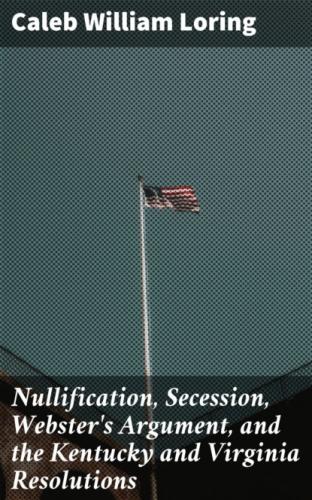“However gross a heresy it may be to maintain, that a party to a compact has a right to revoke the compact, the doctrine itself has had respectable advocates. The possibility of a question of this nature proves the necessity of laying the foundations of our national government deeper than in the mere sanction of delegated authority. The fabric of American empire ought to rest on the solid basis of the consent of the people.”
And amongst all the ratifications by the States, there is not one which speaks of the Constitution as a compact between States. “They say they ordain and establish it; we do not speak of ordaining leagues and compacts.” He argued that the Constitution that was formed was not a league, confederacy, or compact between States, but a government proper, creating direct relations between itself and individuals of the States. It punished all crimes committed against the United States. It had power to tax individuals, in any mode and to any extent, and it possessed the power of demanding from individuals military service. “It does not call itself a compact; it uses the word compact but once and that is when it declares that the States shall enter into no compact. It does not call itself a league or a confederacy but it declares itself a constitution.” “A constitution is the fundamental regulation which determines the manner in which the public authority is to be executed,”[6] “the very being of the political society.” It says, this Constitution shall be the law of the land, anything in any State constitution to the contrary notwithstanding; “and it speaks of itself, too, in plain contradistinction from a confederation; for it says that all debts contracted and all engagements entered into by the United States shall be as valid under this Constitution as under the confederation; it does not say as valid under this compact, or this league, or this confederation.”
“Again the Constitution speaks of that political system which is established as the Government of the United States. Is it not doing strange violence to language to call a league or compact between sovereign powers a government?”
The United States Government thus originated from the people, as did the State governments. It is created for one purpose, the State governments for another; it has its own powers, they have theirs. There is no more authority with them to arrest the operation of a law of Congress, than with Congress to arrest the operation of their laws.
It was an Union among the States that should last for all time. It contains provisions for its amendment, none for its abandonment at any time. It declares that new States may come into it, but it does not declare that old States may go out.
The Government was brought into existence for the very purpose of imposing certain salutary restraints on the State governments: it gave the United States sovereign powers over the States; it could make war, it could coin money, it could make treaties; it prohibited a State from making war, coining money, or making treaties; it gave the United States the exclusive power to make citizens. The people erected this Government; they gave it a Constitution, and in that Constitution they enumerated the powers they bestowed; they made it a limited Government; they defined its authority. They did not leave it to the States to carry out the legal action—the application of law to individuals—as the Confederacy did. In the Constitution itself it declared the Constitution and the laws of the United States, made in pursuance thereof, shall be the supreme law of the land, anything in the constitution or laws of any State to the contrary notwithstanding. No State law is to be valid which comes in conflict.
Having enumerated the specified powers of the Government, it gives to Congress as a distinct and substantive clause, the power to make all laws which shall be necessary and proper for carrying into execution the foregoing powers and all other powers vested by this Constitution in the Government of the United States or in any department or office thereof.
Who is to decide when a controversy arises between the laws of a State and the United States? The claim of South Carolina is that instead of one tribunal we are to have four and twenty, as many tribunals as States; that each State is at liberty to decide as to the constitutionality of an act for itself and none bound to respect the decision of others.
Конец ознакомительного фрагмента.
Текст предоставлен ООО «ЛитРес».
Прочитайте эту книгу целиком, купив полную легальную версию на ЛитРес.
Безопасно оплатить книгу можно банковской картой Visa, MasterCard, Maestro, со счета мобильного телефона, с платежного терминала, в салоне МТС или Связной, через PayPal, WebMoney, Яндекс.Деньги, QIWI Кошелек, бонусными картами или другим удобным Вам способом.
